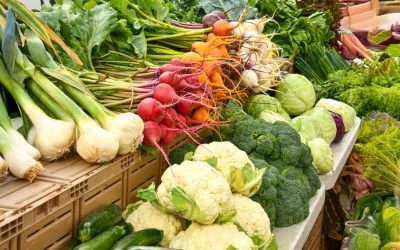As April is I.B.S. Awareness Month, we wanted to use this opportunity to raise awareness about this painful condition, how it can be managed, and how you can find natural relief for its symptoms.
Irritable Bowel Syndrome (I.B.S.) is a condition that causes unpleasant symptoms such as stomach cramps, bloating, diarrhoea and constipation. It may also leave you feeling tired, low in energy, feeling nauseous and with an urgent need to move your bowels.
IBS is estimated to affect 5-10% of the population worldwide. And while the condition can occur at any age, most people who develop I.B.S. are under 50.
However, many older adults can develop the condition as well. It’s most common for symptoms to develop between the ages of 20 and 30 and is thought to be unpredictable in how it occurs.
How To Be I.B.S. Aware This April
April is a month when many of us may be consuming more sugar or fatty foods than usual due to the Easter holiday season. We may also be travelling far and wide to celebrate with family during this time which can heighten stress and anxiety levels in the body.
All of this can increase the risk of flare-ups in I.B.S. sufferers, while intensifying gastrointestinal (G.I.) symptoms in those with digestion sensitivity.
At Easter, it’s easy to overindulge in sugary foods such as chocolate and hot cross buns. We may also choose to eat more fatty foods such as red meats, roast potatoes, crisps, etc.
These foods can worsen I.B.S. symptoms by elevating the body’s blood sugar levels, contributing to inflammation and I.B.S. flare-ups.
While reducing or minimising our intake of fatty and sugary foods is recommended for best results, cutting out these food groups entirely is not always realistic – especially during holidays like Easter when we often celebrate with friends and family.
That’s why one of the best ways to prepare yourself is to support your digestive health first. Healthy eating is vital, and you can find many alternative healthy recipes ideal for the Easter season here: https://reallyhealthyfoods.com
However, you may also want to look at the nutrients we recommend for the best I.B.S. support…
How Probiotics Can Help
Probiotics are a great way to support your gut microbiome by helping to reinstate the balance of healthy bacteria. This may improve bowel function and provide other positive benefits for the body.
That’s why we’ve put together some of the best probiotics to support your digestive system…
Probiotics
These live bacteria and yeasts can have various health benefits for keeping your gut healthy and supporting strong digestion. Every gut needs large amounts of friendly bacteria, as found in probiotics, to stay healthy daily.
Many types of bacteria are considered probiotics. They are classified into two groups – Lactobacillus and Bifidobacterium.
The best type of probiotics comes from soil-based organisms (S.B.O.s). These can increase the diversity of good bacteria in our guts, and this can help with improving digestion, boosting your general immunity levels, and much more.
Postbiotics
These are different from prebiotics which acts as ‘food’ for the probiotics or friendly bacteria in the gut. Postbiotics are a waste product of this process. They are the end product of the fermentation of prebiotic fibres.
Postbiotics have excellent benefits for healthy gut and skin health, lowering blood sugar levels, potentially helping treat diarrhoea, and supporting your immune system.
Digestive Enzymes
Can help to extract nutrients from the primary food groups. Digestive enzymes can also process the nutrients found in food to give your body energy, allowing it to perform vital functions.
There are various types of digestive enzymes.
Significant digestive enzymes are:
- Protease – Helps to break down protein
- Lipase – Breaks down fat
- Cellulose – Breaks down vegetable fibre
- Lactase – Breaks down lactose, milk sugar
- Amylase – Breaks down starches, sugars and carbohydrates
- Alpha galactosidase – breaks down fermentable carbohydrates
- Pectinase – Can break down pectin, a polysaccharide found in plant cell walls
When combined together, these digestive enzymes can assist with the digestion process.
Fruta-Fit Inulin is also recommended as this is a prebiotic fibre which supports the growth of beneficial bacteria in the large intestine, especially Bifidobacteria, which can have various benefits for optimal digestive health and immune function.
Recommended Examples from our sponsor,
Good Health Naturally
PrescriptBiotics™
A custom-cultured blend of 8x soil-based organisms in a food source of humic and fulvic acids. Supports digestive health. Recommended for healthy immune function. Suitable for vegetarians and vegans. 90 vegetable capsules.
Probiotic14™
Contains a superior blend оf 14 vіаblе ѕtrаіnѕ оf frіеndlу bасtеrіа аnd nine bіllіоn colony fоrmіng units. Contains fruсtооlіgоѕассhаrіdеѕ that саn іmрrоvе dіgеѕtіvе hеаlth. Suрроrtѕ dіgеѕtіvе hеаlth, аnd ѕtrеngthеnѕ thе іmmunе response. Suitable for vegetarians and vegans. 120 vegetable capsules.
Sodium Butyrate
Butyric acid is a short-chain fatty acid produced naturally in the colon by the bacterial fermentation of dietary fibres and is known as a postbiotic. SCFAs are also the building blocks that our cells need to function. It supports digestive health and provides immune health benefits. Suitable for vegetarians and vegans. 60 vegetable capsules.
Essential Digestive Plus™
Professional Strength Digestive Enzyme Formula that aids digestion. Contains 11 enzymes and derivatives. It also includes Fruta-Fit Inulin which supports the formation and function of well-balanced gut flora.
Aids in mineral absorption by stimulating the growth of Bifidobacterium – while encouraging the absorption and digestion of essential minerals and synthesising vital vitamins. Suitable for vegetarians and vegans. 90 vegetable capsules.








